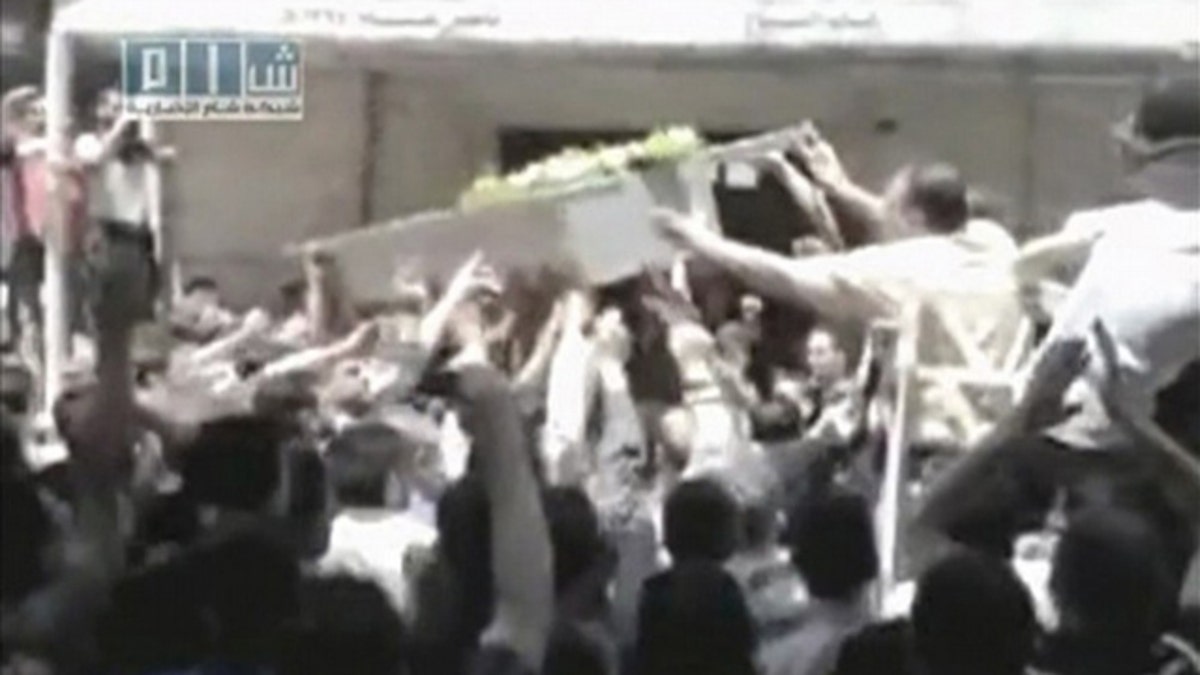
People shout slogans as a coffin is lifted onto a vehicle during a funeral for what was believed to be a person killed in the latest crackdown on protests in the city of Homs. This still image was taken from video uploaded on a social media website May 21, 2011. (Reuters)
BEIRUT – Thousands-strong funeral processions filed out of mosques and past closed shops in the central Syrian city of Hama on Saturday, as mourners buried dozens of protesters shot dead by security forces a day before.
A Syrian human rights activist increased Friday's death toll among protesters to 63, up from an initial count of 48. Most of the dead were killed in Hama after troops opened fire on crowds.
Mustafa Osso also said Saturday that the Internet had been mostly restored, a day after authorities shut it down.
At least 1,270 people have been killed since an uprising against President Bashar Assad's regime began in mid-March, according to the Local Coordination Committees, which helps organize and document Syria's protests.
The Syrian Observatory for Human Rights said Saturday that at least 48 people were killed in Hama, which has become a new center for protest and violence. In 1982, the Syrian regime heavily bombed the city to crush an uprising, killing thousands.
After noon prayers, tens of thousands of people streamed out of mosques carrying coffins of the dead and headed toward the two city's main cemeteries, said Rami Abdul-Rahman, the rights group's director.
Friday's protests appeared to be the biggest since the uprising began, with people gathering in ever larger numbers in cities and towns across the country, Abdul-Rahman said.
Hama residents said most shops were closed to protest the shootings.
"People are in a state of shock," a resident, who spoke by telephone, said on condition of anonymity for fear of government reprisals. "God knows whether they will kill more people during the funerals."
Witnesses' reports could not be independently verified. The Syrian government has severely restricted the media and expelled foreign reporters, making it nearly impossible to independently verify what is happening there.
The Syrian Observatory for Human Rights also said authorities released a leading opposition figure Saturday. Ali Abdullah of the Damascus Declaration Group had been jailed since 2007.
Authorities have released hundreds of political prisoners this week after Assad issued a general amnesty Tuesday.
Assad also created a committee that he said would pave the way for a national dialogue in an attempt to end the uprising, which is posing the most serious challenge to the Assad family's 40-year rule. What began as a disparate movement demanding reforms has grown into a resilient uprising seeking Assad's ouster.
Assad has invited officials from 12 outlawed Kurdish parties to meet him, said Mohammed Moussa of the Kurdish Leftist Party, whose group was invited. He said the meeting is expected in the coming days.
Such a move would have been unthinkable only a few months ago. Assad granted citizenship two months ago to stateless Kurds in eastern Syria -- aimed at addressing protesters' grievances.
About 1.5 million of Syria's 22 million people are Kurds. Syria's Kurdish minority has long complained of discrimination.
